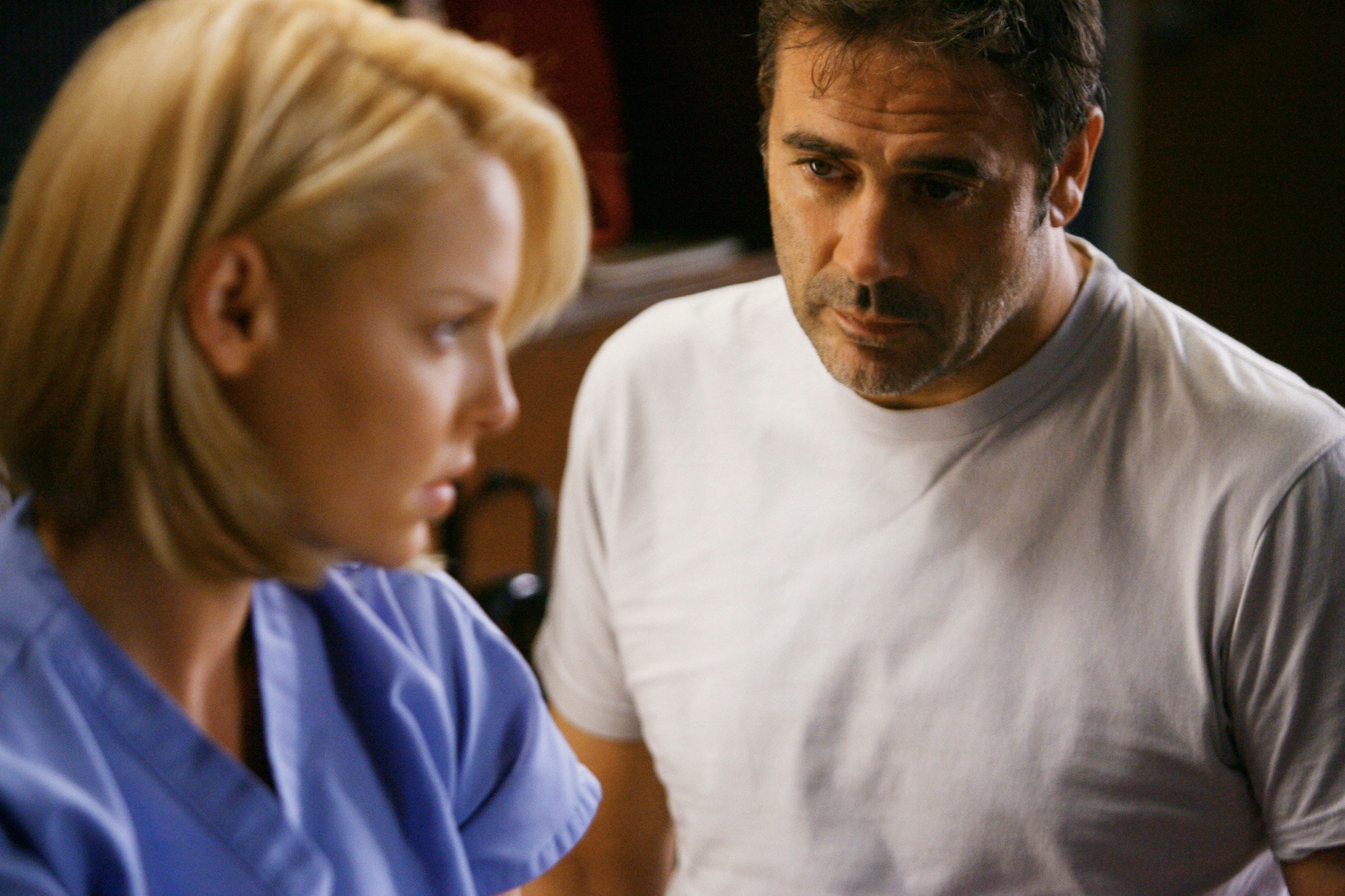Remembering Denny's Death & Impact: A Look Back | Google Discover
Could a single scene, a fleeting moment in a television drama, truly shatter hearts and leave an indelible mark on viewers years after its broadcast? The answer, in the case of Denny Duquette's demise in Grey's Anatomy, is a resounding yes. His death, a devastating plot twist, not only reshaped the narrative but also resonated deeply with audiences, proving the power of storytelling to evoke profound emotion and lasting impact.
Denny's story, a tapestry woven with threads of hope, love, and ultimately, tragedy, unfolded against the backdrop of Seattle Grace Hospital. He was a patient, a romantic interest, and a catalyst for dramatic change, particularly for the character of Izzie Stevens. His journey, though tragically cut short, remains a testament to the power of connection and the enduring pain of loss.
The fateful day arrived on May 15, 2006, in the second season finale, aptly titled "Losing My Religion." Denny, despite securing a donor heart, succumbed to a fatal stroke. This shocking turn of events, a brutal subversion of viewers' expectations, left an emotional void. His demise not only robbed Izzie of her happiness, but also set in motion a series of events that shaped her character arc for seasons to come. The final scene, where Izzie, in her pink prom dress, cradled Denny's lifeless body, remains one of the most heart-wrenching moments in television history, solidifying the narrative's profound emotional impact.
- Alice Rosenblum From Rise To Leaks Onlyfans What You Need To Know
- Alice Rosenblum Latest Leaks Free Porn Watch Now
| Attribute | Details |
|---|---|
| Full Name | Denny Duquette |
| Date of Birth | January 6, 1947 |
| Place of Birth | Nelson Hospital, Kingston Road, Merton Park, London |
| Death Date | May 14, 2006 (7:42 PM) |
| Cause of Death | Fatal Stroke |
| Age at Death | 36 |
| Occupation | Patient (fictional character) |
| Significant Relationships | Izzie Stevens |
| Notable Appearances | Grey's Anatomy |
| Portrayed By | Jeffrey Dean Morgan |
| Hospital Affiliation | Seattle Grace Hospital (fictional) |
| Patient Number | 34986 |
| Key Storyline | Heart transplant, relationship with Izzie Stevens, tragic death |
| Memorable Moments | His relationship with Izzie Stevens, the fight for the heart transplant, his hallucination appearances. |
| Reference Link | Wikipedia - Denny Duquette |
The narrative of Denny Duquette, while fictional, touched on universal themes of love, loss, and the fragility of life. The writers, particularly Shonda Rhimes, didn't shy away from exploring the raw emotions associated with his illness and eventual death. He was a man with a medical condition, hoping for a second chance at life, which offered viewers a glimpse into the lives of those battling serious illnesses and the emotional toll it takes on both patients and their loved ones. The fact that his character was allowed to return later, as a hallucination, only enhanced the already complex emotions.
His passing became a pivotal moment, indelibly impacting Izzie Stevens' character development. The aftermath of his death saw her grappling with grief, making questionable choices, and experiencing profound personal growth. The writers took the opportunity to show the aftermath of loss and how grief can reshape a person's worldview and life choices. The trauma and emotional upheaval of losing Denny, as portrayed through Izzie, was a focal point that resonated with viewers who had experienced similar losses in their own lives.
Beyond the immediate impact on the characters, Denny's death served a broader purpose within the show's narrative structure. It highlighted the unpredictable nature of life and the capricious ways in which fate can intervene. This narrative device underscored the fact that not all storylines could or should end with a happy ending, adding a layer of realism to the medical drama. This contrasted with the usual escapism found on television, and provided the show with a layer of maturity often missing from other shows.
- Alice Rosenblum Leaks The Latest News Updates You Need To Know
- Levi Hoover Controversy What You Need To Know Latest Updates
The impact of his passing extended beyond the screen, sparking conversations and generating fan theories. It became a topic of discussion in online forums, social media platforms, and even academic analyses of the show's impact. The intensity with which audiences reacted to Denny's death revealed a powerful connection, and its testament to the show's ability to evoke feelings of empathy and identification.
Even after his death, Denny continued to make appearances in the show, initially as a ghostly vision for Izzie. Two seasons after his death, he appeared to her when she started hallucinating, a dark manifestation related to a brain tumor. These appearances allowed the writers to explore her psychological state and further develop her character. It underscored how deeply Denny had penetrated her psyche. They became a way to revisit a beloved character and keep his memory alive for the audience.
However, Denny's story isn't the only one where loss has left its mark. The television landscape is full of similar stories. For instance, the character of Linda Reagan on the show Blue Bloods, was also written out in a shocking way. Her death was revealed at the beginning of season 8, after a helicopter accident. The sudden nature of her passing, and the lack of closure for the character, left a void for viewers who had followed her journey for seven seasons. The impact of Linda's death was felt throughout the show's narrative, affecting Danny Reagan and his family.
Another example of loss and its impact on a narrative can be found in the Netflix series Beef. While the story does not involve death in the same way, the escalating feud between Danny and Amy is, at its heart, a story about the destructive consequences of conflict. The show explores how petty grievances can spiral out of control. It has been praised for its unflinching portrayal of human behavior, making the audience wonder if the characters will ever achieve peace or reconciliation. The tension, the unresolved issues, and the potential for catastrophe highlight the power of storytelling to reflect the complexities of human relationships.
On the other hand, in the context of Broadchurch, the death of Danny Latimer served as the central mystery around which the series revolved. Danny's death became the focal point of the plot, triggering a police investigation and unraveling secrets within the small coastal town. This story serves as a reminder that loss is also central to the story's progression. The investigation into Danny's death and the search for his killer exposed the dark undercurrents within a seemingly idyllic community. The narrative explores the emotional toll of grief and suspicion on the Latimer family, as well as the broader impact of the tragedy on the residents of Broadchurch.
In the film Ocean's 8, the character of Danny Ocean is referenced, reminding viewers of his presence in the universe even though he is not physically present. The film's focus on his sister, Debbie Ocean, as she plans a heist, continues a legacy in a way. While the film is a testament to a character, it is the absence of the character that also holds weight. His legacy is felt throughout the film, and is one of the most important aspects of the plot.
The concept of loss also exists in the world of music. The impact and influence of musicians like Laine, formerly of The Moody Blues, and Denny, is a testament to the enduring legacy of music. This demonstrates that not all losses are physical, but can refer to the loss of creativity, of a bandmate, or a moment in time. The contributions to music of these talented individuals should never be overlooked.
In these various instances, whether it be the death of a character, a family member, or a loved one, the narrative always explores the far-reaching effects of loss. It shows how it can shape the actions and emotions of those left behind, and how it can redefine the very fabric of a story. Denny Duquette's story remains a powerful example of how a character's passing can create emotional impact, which echoes in the world of television, and in our lives, long after the credits roll.
While the cause of Denny's death was a fatal stroke, the circumstances surrounding his passing highlighted his fear of hospitals. He was apprehensive of being in one, worried that he would not wake up. This vulnerability added a layer of depth to his character. It made his situation even more poignant for the audience who related to his fears. His fear was understandable, and the writers used it to amplify the emotional impact of his fate.
The impact of loss, like the ripple effect of a stone dropped into water, extends far beyond the initial event. Denny's death was not merely a plot point, but a catalyst for exploring the nuances of human relationships and the resilience of the human spirit. The death of Denny Duquette serves as a poignant reminder of the power of television storytelling to evoke strong emotions and leave a lasting impression. His story is more than a mere plot device. It's a testament to the enduring impact of love, loss, and the indelible mark left by a fictional character on the hearts of viewers.
Article Recommendations
- Alice Rosenblum Latest Leaks Onlyfans Content Must See
- Top Onlyfans Leaks Alice Rosenblum Get The Latest Now



Detail Author:
- Name : Evelyn Wuckert
- Username : damion34
- Email : margarett78@hotmail.com
- Birthdate : 1972-07-15
- Address : 4787 Sipes Forge Apt. 327 Zemlakberg, DE 45003
- Phone : +1-520-807-5063
- Company : Mann and Sons
- Job : Director Of Business Development
- Bio : Id in ipsa deleniti consequatur occaecati cumque dolores cumque. Neque excepturi perferendis perspiciatis doloremque aut et. Ipsum facilis aut sed. Molestiae doloremque sit enim et repellat.
Socials
instagram:
- url : https://instagram.com/marisol_heidenreich
- username : marisol_heidenreich
- bio : Non illo in nemo ex. Praesentium harum rerum labore impedit totam nemo.
- followers : 4286
- following : 756
facebook:
- url : https://facebook.com/marisol4316
- username : marisol4316
- bio : Qui velit dignissimos in numquam nisi amet. Sunt maxime similique consequatur.
- followers : 4093
- following : 1471
linkedin:
- url : https://linkedin.com/in/mheidenreich
- username : mheidenreich
- bio : Error rerum occaecati porro eum et nostrum.
- followers : 3880
- following : 11